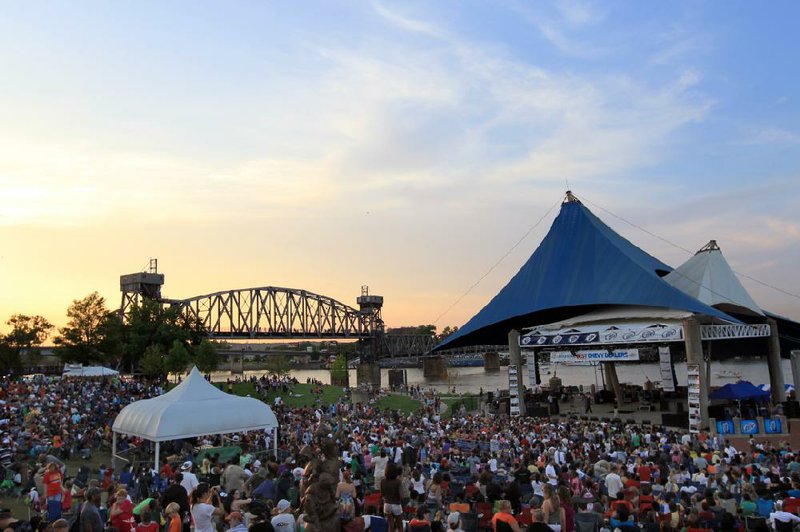After 40 years on the banks of the Arkansas River, the state's largest music festival is no longer above water.
The Riverfest's board of directors released a statement Tuesday announcing the event's suspension -- and that of its sister event Springfest -- citing rising costs, weather and competition.
"With our bills paid, and our heads held high, we are closing our doors," Riverfest board member Cheddy Wigginton said in the statement.
While outlining the large losses and declining attendance the festival faced in recent years, Riverfest Executive Director DeAnna Korte, who has worked for Riverfest Inc. for 20 years, got choked up explaining the decision.
Riverfest through the years
Click here for larger versions
"I'm still in a little bit of shock. It's sad," she said. "Riverfest has always been about the family. It's been about people coming together to do something fun and good for the community."
Korte said the organization's nonprofit status and budget of $2.6 million made it difficult to book bigger acts.
"That may sound like a lot, but in the world of music festivals, it is a shoestring budget," she said in the statement.
Michael Marion, the general manager for the Verizon Arena in North Little Rock since 1997, said this suspension comes at a time when more and more music festivals have popped up across the country. Different events pull from the same talent pool, Marion said, which drives up prices to book artists.
Several other festivals folded in 2016, including Wakarusa in Ozark and BayFest in Mobile, Ala. Korte said Riverfest and similarly sized events had a hard time competing with big-name festivals in the region such as Memphis in May and Bonnaroo in Manchester, Tenn.
Entertainers requiring a 50 percent deposit in advance also made things difficult financially, Korte said.
The festival has lost money for the past few years, with a net loss of $300,000 in 2017, Korte said.
According to the most recent IRS Form 990s available, Riverfest lost about $92,000 in 2013 and almost $187,000 in 2014. According to the 2014 form, Korte received more than $102,000 in reportable compensation from Riverfest Inc. and related organizations for that year.
A loss for downtown
Riverfest attendance in 2017 was about 125,000 people, with 30,000 people attending Springfest, a free, family-oriented event that began in 2016 after Riverfest began to target the 18- to 50-year-old demographic, Korte said. Riverfest had an estimated 140,000 attendees in 2016, with 15,000 attending Springfest, and 220,000 attendees in 2015 before the family portion was broken off into its own event.
In total, Riverfest contributed $1 million in proceeds to the city, which includes repairing fences in pavilions in Riverfront Park and a new roof on the First Security Amphitheatre.
The festival had at its height an estimated annual economic footprint of $33 million on the city, according to the statement.
"Riverfest's 40-year run in Little Rock has been a tremendous destination event, creating a significant economic impact in Central Arkansas," Little Rock Convention and Visitors Bureau President and CEO Gretchen Hall said in a statement.
Bob Major, executive director of the North Little Rock Convention & Visitors Bureau, said Riverfest filled up hotels along on both sides of the Arkansas River, and the event's suspension would be a loss for businesses in both cities.
Neither Korte nor Marion attributed the 2016 decision to split off Springfest as a factor in Riverfest's financial troubles.
Korte said crime was not a factor either, though she said people have become generally wary of large crowds in the past few years because of terrorist attacks such as the Boston Marathon bombing in 2013.
Korte said the festival sold tickets to people in 40 states in 2017 and drew people who might not otherwise visit downtown Little Rock into the restaurants and shops near Riverfront Park.
Josh Quattlebaum, head brewer at Damgoode Pies, said the restaurant's outdoor patio was booked a week in advance for this year's Riverfest, and the restaurant made an extra $18,000 to $20,000 that weekend.
Stickyz owner Suzon Awbrey said her bar made from 25 to 30 percent more on festival weekends.
"It was always crazy," she said. "The good kind of crazy."
But Noel Ferguson, assistant general manager at Gus's World Famous Fried Chicken, said business was so bad during this year's festival that the restaurant had planned to close for the next one.
"You know, [to] save on our light bill," he said.
Moving forward
Riverfest began in August 1978 when the Junior League of Little Rock engaged the American Wind Symphony. It was called the Summer Arts Festival and was held at Murray Park. When the festival changed its name and outgrew its location, it moved downtown, and the need for permanent staff and an executive director arose in 1987, according to the statement.
The festival marked the beginning of Little Rock summers for generations of families, Mayor Mark Stodola said in a statement.
"It is part of the arts and culture that makes our home a wonderful place to live," Stodola said. "My hope is that a new group of citizens will pick up the torch they are leaving behind and start a new endeavor reflecting music as an important element of our city."
Korte said the loss of the annual event will be felt by those who volunteered to make it happen. More than 2,500 people volunteered to run the festival this year: 250 people were on the planning committee, 30 people were on the board and three people were on staff, she said.
Korte said she wasn't sure if the festival might return on a smaller scale in the future.
"We'll wait and see what comes," she said. "My hope would be that somewhere down the road, hopefully the festival can resurrect and come back."
Joe David Rice, tourism director for the state Department of Parks and Tourism, said he was stunned when he got the news. He said he grew up going to Riverfest, which started during a time when there weren't many entertainment opportunities in central Arkansas.
Though Riverfest will be missed, there are other burgeoning music events in El Dorado and northern Arkansas that will pick up the slack, Rice said.
"We'll miss Riverfest, but I sure don't think it's the end of the world," he said.
Quattlebaum said he has attended Riverfest since he was 6 years old. He had his first beer there during the summer after his freshman year of college, and he can still remember hearing Lynyrd Skynyrd from the VIP section in 2013.
He said the festival gave Little Rock the atmosphere of a bigger city. It almost felt like Mardi Gras in New Orleans.
"That was the festival for Arkansas."
Metro on 07/19/2017




